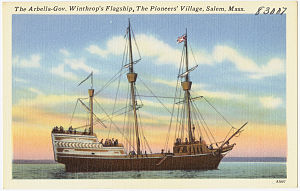 This replica of Arbella was built for the 300th anniversary of Salem in 1930 in conjunction with Pioneer Village. It fell into disrepair and was dismantled in 1954. | |
| History | |
|---|---|
| Name | Arbella, Arabella [1] |
Arbella or Arabella [2] was the flagship of the Winthrop Fleet on which Governor John Winthrop, other members of the Company (including William Gager), and Puritan emigrants transported themselves and the Charter of the Massachusetts Bay Company from England to Salem between April 8 and June 12, 1630, thereby giving legal birth to the Commonwealth of Massachusetts. John Winthrop is reputed to have given the famous "A Model of Christian Charity" sermon aboard the ship. Also on board was Anne Bradstreet, the first European female poet to be published from the New World, and her family.
Contents
The ship was originally called Eagle, but her name was changed in honor of Lady Arbella Johnson, a member of Winthrop's company, as was her husband Isaac. [3] Lady Arbella was the daughter of Thomas Clinton, 3rd Earl of Lincoln. [4]